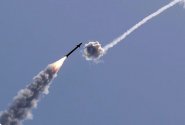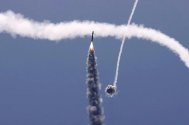You are using an out of date browser. It may not display this or other websites correctly.
You should upgrade or use an alternative browser.
You should upgrade or use an alternative browser.
Persian Gulf & Middle East Military News, Reports, Data, etc.
- Thread starter delft
- Start date
Equation
Lieutenant General
That's....$80K...$160K....$240K....$320...etc. for intercepting each unguided cheaply made bottle rockets.
Though the weapons are often crude and many lacked guidance systems, their sheer numbers and low cost are an advantage against Iron Dome. While a rocket may cost as little as a few hundred dollars, each interceptor costs around $80,000, according to .
Though the weapons are often crude and many lacked guidance systems, their sheer numbers and low cost are an advantage against Iron Dome. While a rocket may cost as little as a few hundred dollars, each interceptor costs around $80,000, according to .
That's....$80K...$160K....$240K....$320...etc. for intercepting each unguided cheaply made bottle rockets.
Though the weapons are often crude and many lacked guidance systems, their sheer numbers and low cost are an advantage against Iron Dome. While a rocket may cost as little as a few hundred dollars, each interceptor costs around $80,000, according to .
Well they can't exactly not intercept them. Also remember that the US foot a lot of these bills and if you adjust for quality of life as well as productivity of American and Israeli individuals, then the real cost of each iron dome missile is not that much more than a rocket launched at Israel. Sort of like how an $100 million dollar Chinese fighter is less affordable to China than a $100M dollar fighter is to the US. So it's not exactly a question of attrition especially since Israel produces iron dome itself.
It has the problem any missile defense system has. It is more expensive than an offensive missile and against saturation attacks it fails.
I wonder if the Palestinians switched to two stage systems if Iron Dome would still be effective.
I doubt it would be effective against a maneuverable missile like the Fateh-110 either. Hamas probably doesn't have any advanced missiles but I wouldn't be surprised if Hezbollah did.
I wonder if the Palestinians switched to two stage systems if Iron Dome would still be effective.
I doubt it would be effective against a maneuverable missile like the Fateh-110 either. Hamas probably doesn't have any advanced missiles but I wouldn't be surprised if Hezbollah did.
It has the problem any missile defense system has. It is more expensive than an offensive missile and against saturation attacks it fails.
I wonder if the Palestinians switched to two stage systems if Iron Dome would still be effective.
This is entirely the wrong way to think about interceptor missiles, costs, and attrition warfare. The following is not commenting on the politics, just an arbitrary situation.
One has to keep in mind that the targets value should be accounted for. Without intercepting, the loss is the target for the adversary's loss of a piece of ordinance, however crude and inexpensive. With a successful intercept, your loss is the interceptor missile. That is potentially a much more favourable net outcome for you but it depends on the target. In this case, it is lives and infrastructure. Even ignoring the lives part, infrastructure intact is probably more valuable than the interceptor missile. An exaggeration to make the point; is it worth shooting a few $1 billion dollar per pop interceptor missiles (hypothetical) at an incoming nuclear warhead on New York city? Of course it is, even if the enemy has more nuclear missiles and warheads than you do those $1B interceptors. It becomes a problem if they shoot all of it but it hasn't reached that level and there are ways to get around it. With Israel, they will perform military attacks to degrade that threat so it isn't allowed to perpetuate into attrition that weakens its financing of those iron dome interceptors.
However it comes a point where attrition needs to be accounted for. In this particular situation, attrition isn't an option for Hamas because Israel has access to far more funding and resources. So the equation is made more complex by very different standards. A $100 rocket is NOT 1000 times more "affordable" to Hamas as a $100,000 interceptor is to Israel.
Missile defence systems don't have that problem because an HQ-16 that intercepts a Tomahawk is actually much cheaper than the Tomahawk even after adjusting for favourable purchasing power for Chinese side. Not in monetary terms and not in difficulty to manufacture or resources required to. That's just one example where missile interceptors aren't always more expensive than offensive ordinance and that's without even accounting for losing whatever that offensive ordinance is targeting.
The Tomahawk has a gas turbine engine and was designed to use TERCOM. A lot more expensive than modern terminal guidance systems and a lot more expensive than a rocket engine. It is made for long distance strikes. These rockets probably don't even have any guidance.
Sure, it is more cost effective to intercept than let it blow up precious infrastructure or people. Sure, the economies have vastly different sizes. But that is assuming they don't have external sources of funding. Also, the price differential isn't something you can simply ignore.
Sure, it is more cost effective to intercept than let it blow up precious infrastructure or people. Sure, the economies have vastly different sizes. But that is assuming they don't have external sources of funding. Also, the price differential isn't something you can simply ignore.
Bloodthirsty Zionists bombed a UN school facility for Palestinian children in Gaza, as is typical for them.
Iron Dome is not effective against BM/Q-BM such as Fateh class because it is designed to deal with primitive, small and slow unguided rockets from Gaza (and can be configured to work against UAVs).It has the problem any missile defense system has. It is more expensive than an offensive missile and against saturation attacks it fails.
I wonder if the Palestinians switched to two stage systems if Iron Dome would still be effective.
I doubt it would be effective against a maneuverable missile like the Fateh-110 either. Hamas probably doesn't have any advanced missiles but I wouldn't be surprised if Hezbollah did.
One has to keep in mind that the targets value should be accounted for.
Without intercepting, the loss is the target for the adversary's loss of a piece of ordinance,
I think you're applying the wrong model here. War is a zero-sum game. This means that if the target is worth "X" to defend, it is also worth "X" to attack. So "X" just gets cancelled out, because it is the same on both sides of the equation. So the relevant variables here are the cost of attacking ordinance versus the intercepting ordinance, which will always be much higher. Therefore, Missile Defense can never sustainably work against a peer-opponent's saturation attacks, only against a much weaker opponent. If you can't destroy your enemy's ability to attack and saturate your defenses, you will inevitably lose.
Bringing this back to the Middle East, this is why "Israel," in its current form as a apartheid state, has no future. Eventually, it will need to accept a "One State Solution" model where Jews are a minority. It will accept it the easy way, or the hard way. Because for the entire Muslim world, from Morocco to Malaysia (the imminent demographic global majority) no other solution is ultimately acceptable to us. Temporary ceasefires and agreement's aside, this land is a strategic piece of real-estate that we will not accept in the hands of any other civilization, period. The math of the situation is this: "Israel" is surrounded by Muslim states that are currently weak, but this is a temporary state of affairs. Muslim nations will eventually get their act together (God willing), and at that point, nothing will save "Israel" and no one is going to come to its help.
p.s. Israel boasts of its "nuclear triad" as its ultimate protection, but it is too small a country to have any effective deterrence. I can literally see most of its nukes on Google Maps. And its diesel subs tied to a couple of ports aren't going to help it either. "Israel" is a hard fortified target for sure, but it is far from invincible against a competent foe.
I think you're applying the wrong model here. War is a zero-sum game. This means that if the target is worth "X" to defend, it is also worth "X" to attack. So "X" just gets cancelled out, because it is the same on both sides of the equation. So the relevant variables here are the cost of attacking ordinance versus the intercepting ordinance, which will always be much higher. Therefore, Missile Defense can never sustainably work against a peer-opponent's saturation attacks, only against a much weaker opponent. If you can't destroy your enemy's ability to attack and saturate your defenses, you will inevitably lose.
Bringing this back to the Middle East, this is why "Israel," in its current form as a apartheid state, has no future. Eventually, it will need to accept a "One State Solution" model where Jews are a minority. It will accept it the easy way, or the hard way. Because for the entire Muslim world, from Morocco to Malaysia (the imminent demographic global majority) no other solution is ultimately acceptable to us. Temporary ceasefires and agreement's aside, this land is a strategic piece of real-estate that we will not accept in the hands of any other civilization, period. The math of the situation is this: "Israel" is surrounded by Muslim states that are currently weak, but this is a temporary state of affairs. Muslim nations will eventually get their act together (God willing), and at that point, nothing will save "Israel" and no one is going to come to its help.
p.s. Israel boasts of its "nuclear triad" as its ultimate protection, but it is too small a country to have any effective deterrence. I can literally see most of its nukes on Google Maps. And its diesel subs tied to a couple of ports aren't going to help it either. "Israel" is a hard fortified target for sure, but it is far from invincible against a competent foe.
Not getting into the politics of the second two paragraphs, you're right about being fair in assuming the target to be presenting equal and opposite values to both sides. The topic of attrition is separate to the topic of whether a target is worth defending. My point in my other post was to remind everyone that while an iron dome interceptor is much more costly, the target an interceptor is defending was worth defending for the Israelis. That's it. There is no comment about the attrition. The target's value should be accounted for from the perspective of the defender, hence the action to defend. It isn't simply a question of how many interceptors we have vs how many rockets we think can be shot at us.
Now moving to attrition, you're still right about target worth x to both. In my other post I just pointed out that attrition should account for differing available resources. Let's say Israelis have 100 units of resources that translate to 100 successful intercepts. Hamas has 10 units of resources that translate to 100 units of rockets. Just because they each rocket is 1/10 the resource cost of an interceptor doesn't mean that Hamas can win through attrition. The total available resources matter. Again I'm not talking about the politics or even attempting to be picking or partial to any side. Only interested in the false belief that interceptor missiles are somehow impotent when only nominal costs are considered. The calculus is FAR more complex than gelgoog suggested even if we just consider value of defence (which btw forces other side to expend ordinance) and include available resources.
For example each American BMD interceptor has a different worth when defending against North Korean ICBMs compared to an HQ-17 defending a tent against a drone. It's not simply how much is interceptor and how much is attacking ordinance and result means win to one tactic/strategy.




